Drug Awareness Parent Community Meeting
P-H-M hosted a districtwide drug awareness parent and community meeting on Tuesday October, 21, 2025 to help educate P-H-M families and the greater community about the current drug trends attracting teenagers. This valuable information is something all adults should be aware of, click the image above to watch the recorded video of the presentation. It will only be available until end of business day Thursday, Nov. 20th.
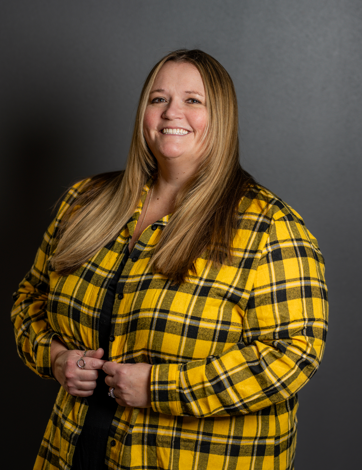 The session was led by Tall Cop Says Stop™ contracted educator, Melissa Moore, CPS. Tall Cop Says Stop™ was created by Officer Jermaine Galloway, an Idaho law enforcement officer since 1997. Galloway is regarded as one of America’s top experts in various drug and alcohol trends and specializes in underage drinking and drug enforcement. For more than 15 years, he has trained school administrators and safety personnel in spotting the dangers that threaten teens and the community. Melissa Moore, a 24-year public health experienced professional, who works to advance the mission of Tall Cop Says Stop™ in helping educate parents/guardians and students about the latest deadly effects of so-called recreational drug use.
The session was led by Tall Cop Says Stop™ contracted educator, Melissa Moore, CPS. Tall Cop Says Stop™ was created by Officer Jermaine Galloway, an Idaho law enforcement officer since 1997. Galloway is regarded as one of America’s top experts in various drug and alcohol trends and specializes in underage drinking and drug enforcement. For more than 15 years, he has trained school administrators and safety personnel in spotting the dangers that threaten teens and the community. Melissa Moore, a 24-year public health experienced professional, who works to advance the mission of Tall Cop Says Stop™ in helping educate parents/guardians and students about the latest deadly effects of so-called recreational drug use.
Click here to access Melissa Moore’s resources referenced in her presentation.
Questions can be directed to the presenter at m3consultingllcwi@gmail.com.
Moore also presented a student focused presentation to Penn students (grades 9-12) during the school day on October 21st and 22nd.
This Friday, Aug. 29, 2025: P-H-M Community Tailgate Party
P-H-M’s Annual Community Tailgate is a long-standing tradition that brings families, students, staff, and community members together to show their Penn pride. The event is held before the Penn Football home opener and is a chance for everyone across the district to connect, celebrate, and support the Kingsmen.
This year’s home opener will be “The Backyard Brawl” against Mishawaka on Friday, August 29th, 2025. Click here for game ticket info.
Gates open at 5:00 p.m. You must have a ticket to the football game to enter. Once inside the stadium head down to the white tents in the south end zone at the Yeoman Family Plaza.

Friday night marks the 67th meeting between Penn and Mishawaka. Penn leads the all-time series 49-16-1.
P-H-M Students Excel on Spring 2025 ILEARN
Penn-Harris-Madison School Corporation (P-H-M) proudly shares the outstanding performance of its students on the Spring 2025 ILEARN assessment, as released by the Indiana Department of Education (IDOE). P-H-M students once again outperformed the state average by an impressive 20 percentage points in the percentage of students passing both English Language Arts (ELA) and Mathematics. This achievement places P-H-M in the top 4% of public school corporations across Indiana (see the charts below).
“These results reflect the exceptional work of our teachers, students, and staff,” said Superintendent Dr. Heather Short. “We remain deeply committed to ensuring every child reaches their full potential, and this data shows that our efforts are paying off.”
P-H-M has maintained its Top 4% ranking for a second consecutive year, a testament to the district’s commitment to academic excellence and the strategies that drive student success. Out of Indiana public schools that passed both ELA and Math, Northpoint and Prairie Vista Elementary Schools are in the Top 10; and Discovery Middle School is #3 in the state.
A closer analysis of the data shows strong gains across grade levels and student groups. Middle school students, in particular, demonstrated significant improvement in math, based on the state’s 2021 benchmark. P-H-M 8th grade Math performance is up 24% since the benchmark year and now the variance over the state average is 28%.
The district’s Free and Reduced Lunch (F/R) student population, which now exceeds 30%, continues to demonstrate notable progress. Among Indiana’s largest public school districts testing close to 5,000 students, P-H-M ranks #1 in the state for the percentage of F/R students passing both ELA and Math.
“These achievements are not by accident,” added Dr. Short. “They are the result of intentional investments in teacher professional development and the implementation of evidence-based instructional practices. We are fortunate to have educators and staff who are deeply committed to supporting every learner.”
Indiana junior high school students are now required to take the SAT for graduation. The IDOE also released SAT results. Among public high schools in pass percentage, Penn High School moved up from #27 last year, to #15 this year.
Results from the Spring 2025 IREAD assessment are expected to be released in early fall, and P-H-M looks forward to sharing those outcomes as well.
ILEARN Math
| Grade 3 | Grade 4 | Grade 5 | Grade 6 | Grade 7 | Grade 8 | |
| PHM | 71% | 65% | 65% | 52% | 57% | 63% |
| State | 52% | 50% | 42% | 40% | 36% | 35% |
| Variance | +19% | +15% | +23% | +12% | +21% | +28% |
ILEARN ELA
| Grade 3 | Grade 4 | Grade 5 | Grade 6 | Grade 7 | Grade 8 | |
| PHM | 60% | 55% | 64% | 57% | 56% | 64% |
| State | 41% | 42% | 41% | 41% | 38% | 43% |
| Variance | +19% | +13% | +23% | +16% | +18% | +21% |
Superintendent Dr. Jerry Thacker Receives Several Honors Upon Retirement
In March, Superintendent of Penn-Harris-Madison School Corporation Dr. Jerry Thacker announced his retirement after 19 years. Under Dr. Thacker’s leadership, P-H-M has achieved extraordinary milestones, including raising the graduation rate from 79% to 98%, ranking in the top 4% of the state academically, and helping students earn more than $200 million in scholarships. He also prioritized school safety, leading P-H-M to be ranked sixth in the nation for school safety initiatives. Click here to read more about P-H-M student success achieved during Dr. Thacker’s tenure.
Dr. Thacker has had a remarkable 53-year career in education working in leadership roles across Indiana and Michigan. As the school year wrapped up and in gratitude for his many contributions to the field of education, Dr. Thacker has received several honors.
These five prestigious awards were conferred upon Dr. Thacker:
- May 4, named IAPSS – District II Superintendent of the Year
- May 9
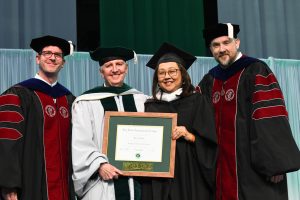
Ivy Tech Community College presented him with an Honorary Degree in College and Community Service at their Commencement
- May 9, Head Start Consortium gave him the “Making a Difference” award for his loyal dedication, unwavering commitment, and his indispensable support of Head Start’s mission at Head Start’s 60th Anniversary Celebration and Board Meeting
- May 21
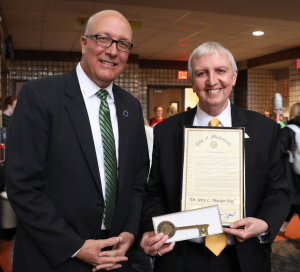
Mishawaka Mayor Dave Wood presented him with a Key to the City and a proclamation declaring May 21st “Dr. Jerry Thacker Day”
- May 30
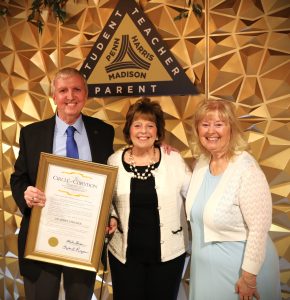
State Senator Linda Rogers presented him with the Circle of Corydon award on behalf of herself and Governor Mike Braun. The award honors Hoosiers who have made remarkable contributions that have bettered Indiana, and who have demonstrated the qualities exemplified by our state’s greatest citizens
Internally, P-H-M school principals, teachers, and students also wanted to thank Dr. Thacker for his years of service and dedication to the district. Several came up with meaningful ways to express their appreciation:
- May 1, Penn High School Bands recognized him for his “caring leadership and service” at the Spring Concert
- May 16
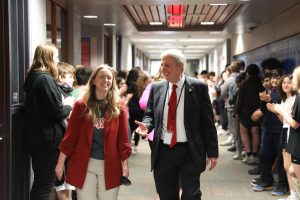
Grissom Middle School students and staff lined the hallways to applaud him as he walked through the school’s hallways - May 16
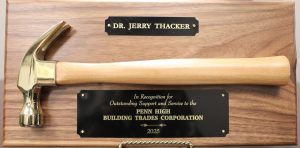
Penn High School Building Trades program presented him with a Golden Hammer for recognition of his Outstanding Support and Service - May 22

Bittersweet Elementary School students and staff lined the hallways to applaud him as he walked through the school’s hallways - May 27
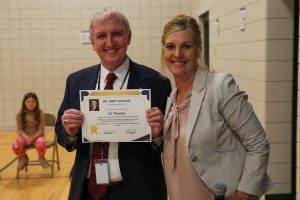
Walt Disney Elementary School establishes the “Dr. Jerry Thacker Achievement Award” to recognize students who exemplify persistence, good citizenship, and positive competitiveness
- May 30
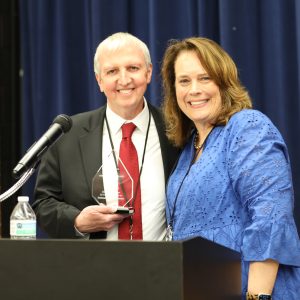
Schmucker Middle School principal presented him with an Elevation Award for 53 years of service in education to students, teachers, and parents - June 2


Prairie Vista Elementary students performed a “We are your Triangle of Success” presentation and gave him a planter with all the thumbprints of students (grades K-5) and staff to illustrate the impact he’s had on their lives
- June 3
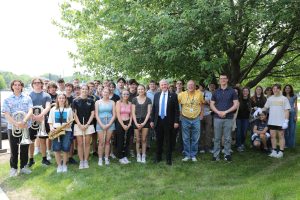
Retiring Penn Band Director Glenn Northern, leads the Symphonic Winds section of the Kingsmen Marching Band in the Penn High School Fight song outside Dr. Thacker’s office at the Educational Services Center. Click here to see the video on Facebook.
Before the end of the 2024-2025 school year came to a close, Dr. Thacker shared the video message below with P-H-M students, teachers, and families.
Dr. Heather Short Approved as New Superintendent
In a special meeting held Tuesday, May 27, the Penn-Harris-Madison Board of School Trustees unanimously (7-0) approved the appointment of Dr. Heather Short as the district’s next superintendent effective July 1, 2025.
Nearly 50 P-H-M teachers, administrators, staff, family and friends showed up to express their overwhelming support of Dr. Short’s appointment.
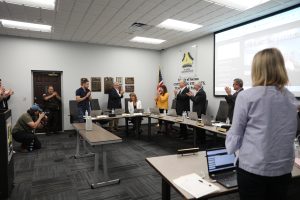
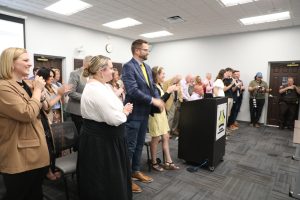

Dr. Short, a lifelong educator who has dedicated her entire 31-year career to P-H-M, will succeed Dr. Jerry Thacker, who is retiring after 19 years of transformative leadership. Dr. Short has served as Assistant Superintendent for Instruction since 2017. During her tenure, P-H-M students have experienced consistent academic growth and achievement.
“I am deeply honored by the Board’s confidence and grateful to Dr. Thacker for his mentorship throughout my career,” said Dr. Short. “It has been the privilege of a lifetime to grow as a leader within this incredible district. I’m excited to continue working alongside our talented staff, dedicated families, and exceptional students to expand opportunities and ensure every child thrives.”
Under Dr. Short’s leadership, P-H-M ranks in the top 4% of Indiana districts based on ILEARN scores. The district also outpaces the state average by 20 percentage points in overall percent passing rates.
“There is no one better—or more qualified—to lead P-H-M’s continued path of academic excellence than Dr. Short,” said Chris Riley, President of the Board of School Trustees. “Her academic expertise and visionary leadership in developing rigorous, relevant curriculum have been key to our students’ success. Dr. Short was the Board’s clear and unanimous choice for superintendent.”

P-H-M is home to some of Indiana’s highest-performing public schools in both English/Language Arts and Math. Prairie Vista Elementary ranks #3 in the state, while Discovery Middle School ranks #2. In Spring 2024, P-H-M’s IREAD pass rate was 86.8%, surpassing the state average of 82.5%. Three P-H-M elementary schools—Prairie Vista (97.7%), Northpoint (95%), and Horizon (95.3%)—achieved pass rates above 90%.
Included in her district-wide academic strategy was a robust Response to Intervention (RtI) program and expanded summer offerings that support both enrichment and remediation.
Dr. Short’s leadership journey reflects deep roots and unwavering commitment to P-H-M. She began her career as a classroom teacher before serving as an Instructional Leader and High Ability Coordinator. Click here to learn how Dr. Short and Board Trustee Katie Bell’s paths crossed when Dr. Short was a 3rd grade teacher at Northpoint. In 2004, she became principal of Prairie Vista Elementary. Recognizing her talent for professional growth and instructional excellence, Dr. Thacker appointed her in 2007 as P-H-M’s first Director of Professional Development—a role she held for a decade before being named Assistant Superintendent.
Throughout her career, Dr. Short has been deeply committed to developing others. She co-created a nationally recognized leadership development program designed to build internal capacity among P-H-M educators and administrators. Her strategic focus on professional development has empowered teachers at every level—from new educators to veteran principals—through initiatives like the annual Literacy Summit and the New Teacher Series.
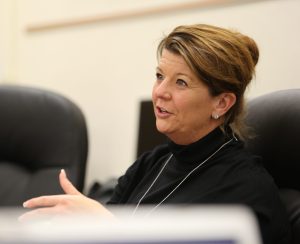

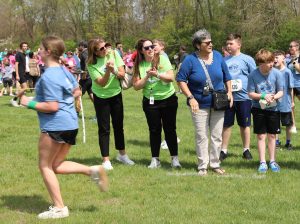
As Assistant Superintendent, Dr. Short has combined her instructional leadership with strong fiscal stewardship. She has overseen the management of multimillion-dollar budgets and successfully secured hundreds of thousands of dollars in state grants—investments that have directly enhanced classroom instruction, expanded student programs, and strengthened districtwide operations.
“Dr. Short possesses one of the most valuable qualities a leader can have: the ability to build genuine relationships,” said Dr. Thacker. “She makes personal connections with teachers, principals, staff, families—and most importantly, students. She understands the P-H-M culture because she helped build it. There is no one more fitting to serve as the next superintendent.”
After the Board approved Dr. Short as the district’s new leader, Board members shared well wishes and comments. Trustee Katie Bell (elected in November 2024) talked about how things have come full circle for her as a former student of Dr. Short’s when she taught 3rd grade gifted and talented students at Northpoint. The two were actually featured in an article that ran in the South Bend Tribune in March 2003. The article featured Dr. Short teaching her students how to use PowerPoint for their Geography reports on Asia. Click here to read the original story.
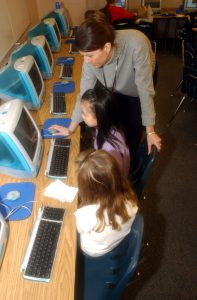
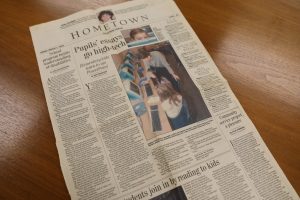

Fast forward to 2013 to when Dr. Short was P-H-M’s Director of Professional Development, she interviewed Bell for a teaching position. Bell was hired as a kindergarten teacher in 2016 at Prairie Vista Elementary School and Dr. Short led the professional development for all new teachers.
“Dr. Short and I are a testament that it’s never goodbye, it’s always see you later,” Bell said. “And I think that shows the true impact of a teacher, that they are in your lives forever, and that you will always remember them.”
Media Coverage
7th Annual Hair Donation Event to be held Nov. 16, 2024
This year’s “Short Hair Because We Care” will hold a hair donation event for the Children With Hair Loss organization will be held Saturday, November 16 at Penn High School’s Studio Theater.

Anyone in the community can donate their hair, but the minimum is 8 inches of hair. Hair that is colored and permed is accepted. Local professional hair stylists will be donating their time to cut volunteers hair for free. Because this is for hair donation, the service provided is just a simple cut, no style.
This event was started in 2019-2020 school year by a group of 7th grade Grissom Middle School students.
“It started as something that students could give, that wouldn’t be money or something they wouldn’t have control over being young students, but everyone can donate their hair, so that’s why we started it: to give everyone an opportunity to serve even if they don’t have other resources,” Ella Smoker Class of 2024. Click to see the WNDU-TV’s story.
Last year, 33 people donated a total of 334 inches (click to see photos)! Donate this year and help beat last year’s totals!
If you’re interested in donating, click here to sign up using the Google form.
Email shbwcphs@gmail.com with questions, and follow the group on Instagram at @shbwc_phs.
If you can’t make it to the event or don’t have enough hair to donate, you can still help out by donating directly to Children With Hair Loss.
Children With Hair Loss is a nonprofit organization that provides hair replacements at no cost to children or young adults facing hair loss at no cost. Whatever the cause, hair loss can have effects that go deeper than cosmetics. Providing this hair is how this organization gives back to the community. You can help us give back to your community and the children facing hair loss by donating your hair or simply spreading the word about the event to everyone!
P-H-M Named 2024 Best Community for Music Education
Penn-Harris-Madison School Corporation was named among the 2024’s Best Communities for Music Education (BCME) in the country by the National Association of Music Merchants (NAMM) Foundation for the 11th year in a row! P-H-M is among only 17 Indiana school districts, out of about 300, that made the list.
Now in its 25th year, the 2024 Best Communities for Music Education program has recognized 583 school districts and 135 schools across the country for the outstanding efforts by teachers, administrators, parents, students, and community leaders and their support for music education as part of a well-rounded education for all children. This recognition celebrates and recognizes K-12 music teachers in school districts who found creative ways for the “show to carry on” despite schools moving online or to in-person settings where masks were required not only for student musicians and instruments.
In P-H-M elementary schools, music class is part of the regular curriculum following state standards. Students are instructed in both vocal and instrument classes. Beginning in 6th grade, P-H-M students at our three middle schools (Discovery, Schmucker and Grissom) have the opportunity to choose choir, orchestra or band as their music elective. Students at Discovery also have the option of choosing Piano Lab. Schools from elementary all the way up to Penn High School also perform musicals.

Penn High School offers the Fine Arts & Communication Academy as part of its unique academy structure. The seven academy design provides Penn students with relevant and meaningful coursework taught in smaller, supportive environments where each student is known well by his teacher and peers. Nearly a third of Penn’s total 3,500 students are enrolled in the Fine Arts Academy with the majority being involved with music programs, either Choir, Orchestra, Band or another music program.

To qualify for the Best Communities designation, P-H-M answered detailed questions about funding, graduation requirements, music class participation, instruction time, facilities, support for the music program, and community music-making programs. Responses were verified with school officials and reviewed by The Music Research Institute at the University of Kansas. Research into music education continues to demonstrate educational/cognitive and social skill benefits for children who make music.
In a series of landmark studies by scientists and researchers at Northwestern University a link was found between students in community music programs and life-long academic success, including higher high school graduation rates and college attendance. In another study from the University, it was discovered that the benefits of early exposure to music education improves how the brain processes and assimilates sounds, a trait that lasts well into adulthood. Beyond the Northwestern research, other studies have indicated that music education lays the foundation for individual excellence in group settings, creative problem solving and flexibility in work situations, as well learning how to give and receive constructive criticism to excel.
eLearning Day for April 8 due to Solar Eclipse
At the P-H-M Board of School of Trustees meeting on Monday, February 26, district administration made a presentation to the Board regarding the total solar eclipse taking place on Monday, April 8. As part of the presentation, district administration announced that for a variety of reasons Monday, April 8 will be an eLearning Day. If the district has used all of its allotted three eLearning Days (we currently have used two), the day will be a Virtual Learning Day. No P-H-M sponsored field trips or planned evening activities will take place on this date. Monday, April 8 is the first day back after Spring Break (April 1-5).
Indiana is in the path of totality and is centrally located in the United States, thus the Indiana Department of Homeland Security is telling tourists, residents, school districts and public agencies to be prepared for three days of potential impact such as, oversized crowds, gridlock traffic, communications disruptions, and even nocturnal animal confusion. Click here to see the full presentation from last night’s Board meeting.
The Indianapolis area and south will experience 100% totality; while the St. Joseph County area will experience 96%. Click here to see a map of Indiana regions that will experience varying degrees of darkness from the Indiana Department of Natural Resources website. The South Bend area will start experiencing darkness at 1:53 p.m., lasting until 4:23 p.m., with 96% totality occurring at 3:09 p.m. and lasting just over 4 minutes. Because these times are around school dismissal times and based on the recommendations of the Indiana Department of Homeland Security and the IDOE, P-H-M will not be holding in-person instruction on April 8.
Thanks to Old National Bank and P-H-M Education Foundation, all students in the district will receive eclipse glasses to use at home with instructions. Mrs. Mindy O’Malley, Director of P-H-M’s Arthur M. Klinger Planetarium and Digital Video Theater, and a team of teachers, are preparing grade-level eclipse information to send home with students. In the classrooms leading up to April 8, teachers will educate students about this nearly once-in-a-lifetime event; the next total solar eclipse where portions of Indiana will be in full totality will be 2099.
If parents have any questions, they should contact their students’ principals. Employees should contact their supervisor or Human Resources.
Back to School Information

We’re thrilled to welcome back all of our 11,000+ students and are excited to help all our students achieve Excellence.
The first day of school will be Wednesday, August 20, 2025 for grades 1 – 12.
- All students in 1st through 12th grades will report to their school buildings that day, and all those who are signed up for transportation services may ride the bus that day.
- Kindergarten orientation takes place on Wednesday, August 20, 2025 with the first full day of kindergarten being Thursday, August 21st.
BACK TO SCHOOL EVENTS. MARK CALENDAR & ATTEND!
- Our elementary schools are hosting many fun Back to School family events starting the week of August 11. Check your school’s Google calendar on its website or be on the lookout from communication directly from your school principal.
- All three Middle Schools are also planning a Walk-Around on Thursday, August 14th. Check the school’s Google calendar on its website or be on the lookout from communication directly from your school principal. Make sure you mark your calendar and plan to attend!
- Penn is hosting a “Walk Around” to help parents and students get familiar with the school:
- Penn High School’s “WALK AROUND” on Saturday, August 16, from 9 a.m. – Noon gives students a chance to familiarize themselves with the school and find where their classes and activities are located.
The BACK TO SCHOOL INFORMATION listed below will help P-H-M parents and students get ready for the 2025-26 School Year!
CONTACTING SCHOOLS OVER THE SUMMER
- Elementary and Middle School Front Offices open Monday, August 4th.
- Penn is open every week day over the summer.
- All schools are open Monday – Friday during business hours. Those hours vary by school.
- Click here for the School Directory of all 15 schools
- Register a new elementary or middle school student by visiting the school after offices open August 4, 2025. Click here to know what documentation you need to bring with you for registration.
- Register a new Penn High School student by calling (574) 254-2851. We will help you schedule your registration appointment and advise you on what information to bring with you to the appointment.
BACK TO SCHOOL PACKETS & FORMS
- Back to School packet & information sheets
- Parent/guardians will sign these three forms in ParentSquare:
- Photo Consent
- Mandatory Curriculum Consent
- Handbook Certification
- These forms will be in Skyward Family Access:
- CHIRP Release
- Chromebook packet
- Authorization to administer non-prescription medication at school
- Back to School Info Sheets
Click here for more information on how to login into your Skyward Family Access account
- Here is the SY 2025-26 one-page calendar showing “at a glance” the start and end dates, as well as scheduled recess and vacation dates.
- All P-H-M families are mailed a District Activities Calendar early August. It lists key school and district events throughout the year. Click here to view a PDF version.
- Our online (Google) calendars are the most up-to-date. You’ll find a link to the P-H-M Corporate Calendar posted on the home page of the District website. It’s a Google calendar that can be added to your personal calendar.
- Each school also maintains an online Google calendar on the home page of each school website that is updated frequently with the school’s scheduled activities and event details. You can also the school’s Google calendar to your personal calendar to remember important dates.
SCHOOL SUPPLIES
- All P-H-M schools provide basic school supplies to our students, free of charge. Therefore, our schools do not issue supply lists. You will need to purchase a backpack, water bottle, lunch box, and other items you want your child to have at home or take with them to school. If other specific items need to be purchased for a class or lab, your child’s teacher will inform you after school starts.
IMMUNIZATIONS AND HEALTHCARE SERVICES
- Click here to make sure you child is up-to-date with all required immunizations.
- Proof of immunizations must be provided to the school office by the first day of school.
- Kindergarten parents, please click here to learn about important kindergarten health information and medical forms before your kindergartner’s first day of school.
- Click here for the forms administering medications at school
- Click here for more information on P-H-M Healthcare Services
- School bus route times and locations will be shared with parents in a Transportation letter to be emailed before school starts
- Parents can check EZRouting to see your child’s bus route information online
- Here Comes the Bus provides real time GPS bus location info so parents know when to send their students out to the bus stop
- Have more questions about Transportation? Visit their webpage for contact information.
- Visit our Food & Nutrition page to see monthly menus and find nutritional information
- See if you qualify for Free/Reduced Lunch and Textbook Assistance. Click here to apply online.
- Online payment for child’s meals
- Other Payment options
- Penn-Harris-Madison uses ParentSquare to send urgent alerts, such as school closings and delays.
- Principals and teachers also use it for noncurricular school and classroom communications.
- Penn High School coaches and teachers who sponsor clubs, academic teams or extracurricular activities use StudentSquare to safely communicate with students, without exchanging cell phone numbers. Click here for details on how students can sign up for StudentSquare.
- Click here for instructions on setting up your account.
- Once your account is set up, families can chose their preferred mode of communication for non-urgent notifications–app, text, email, phone. You can also chose to have all communications automatically translated to your preferred first language. Click here for details on how to personalize your account and check your notification settings.
- Make sure you sign up for ParentSquare to receive school closings/delays urgent alerts.
- Click to see how, when and what factors into P-H-M’s decision makings for 2-hour delays and closings.

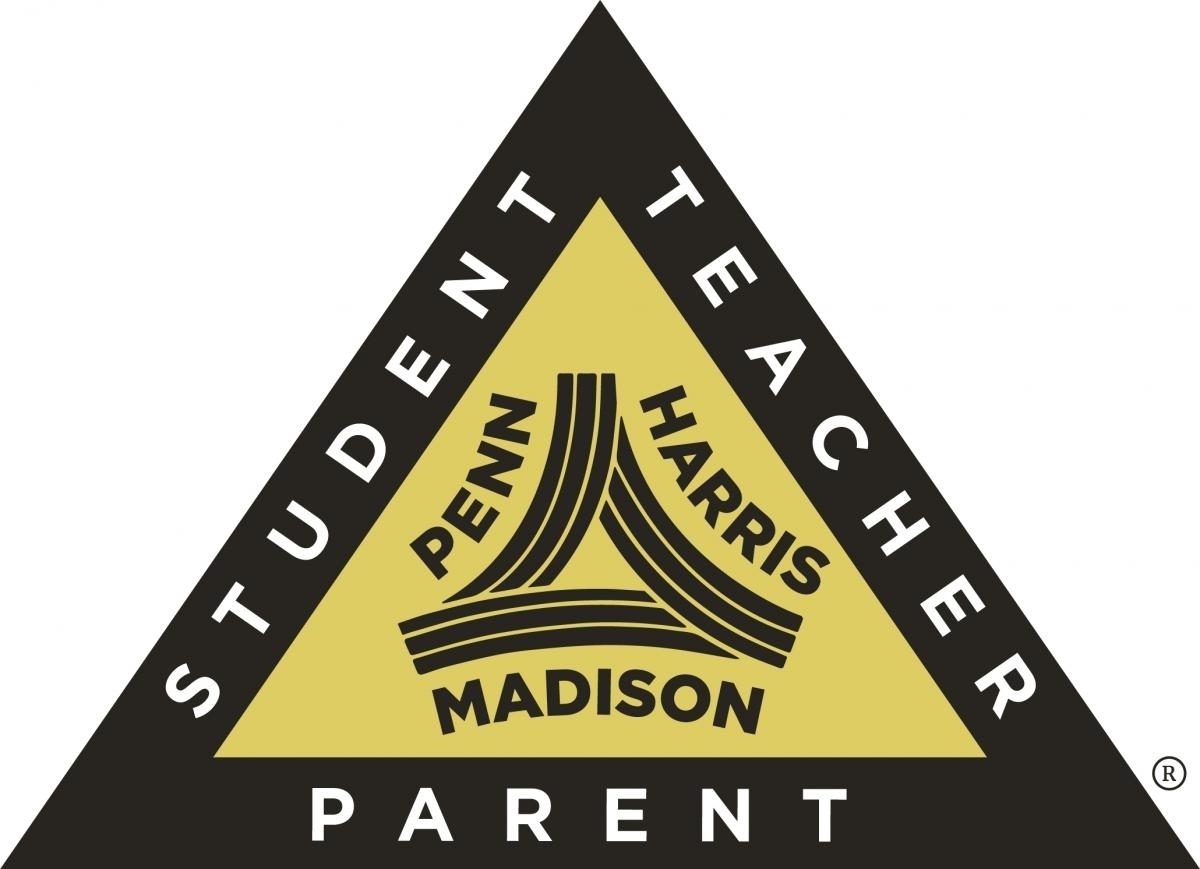 Penn-Harris-Madison’s
Penn-Harris-Madison’s